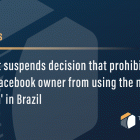Cyptocurrency innovation has made virtually everything in the digital world susceptible to tokenization, and intellectual property is no exception to the trend thanks to non-fungible tokens (NFTs).
NFTs – intangible assets that give their holder a unique certificate of authenticity – are gaining ground in the patent market through the optimization of several critical operations.
The music, art and even video game industries have all witnessed the potential of NFTs to safeguard value; now, intellectual property is being protected in this way also in the field of corporate patents.
The tokenization of these patents is carried out through the blockchain, which allows the parties to guarantee the traceability of the operation, as well as its centralization in one place.
“The current process requires lawyers, contracts, and a lot of bureaucracy, now, using NFTs, the entire model is simplified and all the information is in one place: the blockchain,” she told Bloomberg Línea Lavinia Meliti, who directs the strategy. and execution of IPwe’s business initiatives, a global platform for patent transactions.
Meliti indicates that NFTs offer a great opportunity if we take into account that “worldwide patent transactions, which are mostly licenses and acquisitions, are US$ 180 billion per year, which is a small percentage”.
“What if it gets to 10% or more? (This is) good for innovators, owners, partners, for finance, for service providers, and for society,” she said.
Lavinia Meliti indicated that she likes to refer to NFTs “as digital repositories that store all the information relevant to a patent in a single secure set – and this is happening for the first time in the history of patents.”
Instead of “having to go to multiple places where information about a patent can be stored, everything will exist in one place and the holder will control what can and cannot be seen and by whom”.
She says that “the concept of patents has existed for thousands of years, and the legal frameworks that support them have been in existence since the 15th century. Today, there are around 20 million patents worldwide that are granted by approximately 200 independent national patent offices that exist in each country that grants the patents.”
Incidentally, IPwe has partnered with tech giant IBM to tokenize patents in different areas such as electric vehicles or (soon) the metaverse – the so-called next internet age.
The company facilitates these transactions in Smart Pools, which are a type of patent bank in which patent holders offer their NFT-based licenses to consortium members – many are SMEs – to drive innovation at all scales.
Lavinia Meliti told Bloomberg Línea that she will launch a Smart Pool focused on blockchain patents, “allowing their holders, large companies, to share them with other companies”.
“We will have several of the largest blockchain patent holders in the world, located in Asia, Europe and North America,” said the executive, who did not reveal the names of the large corporations, but informed the interest of several participants in Latin America, as these see potential in markets such as Colombia and Mexico.
As for the participants, she commented that the profiles are divided between the holders of these patents and the members, who pay a kind of subscription to be able to use these technologies.
Small and medium-sized companies with revenues of less than US$1 million per year will have free access to all available patent portfolios.
Patent holders contribute their patents to Smart Pools, where they are then tokenized through NFTs. “If the patent holder decides to license it, license tokens linked to the original NFT will be created,” explains Meliti.
Thus, the tokenized patent license is transferred to the licensee for as long as it is in effect. And thanks to smart contracts, licensees get reminders when those licenses are about to expire.
“The smart contract is integrated into the NFT with standardized terms associated with each patent. The patent holder sets out the terms of their contract, what is public and what is not,” she adds.
According to the expert, “the capital, the parties to the transaction have the transparency, standardization of information and the ease of interaction they need”.
Source: Bloomberg Linea







